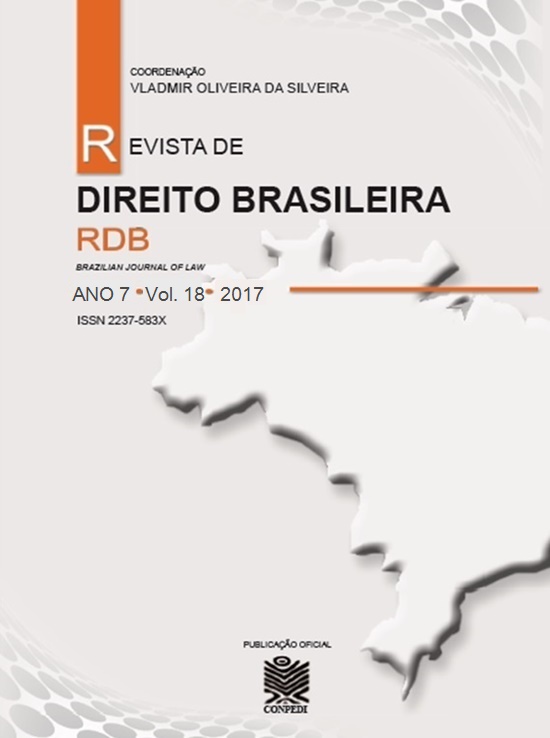THINKING AS A NEGRO: AN ESSAY ON LEGAL HERMENEUTICS
Main Article Content
Abstract
Downloads
Article Details
• O(s) autor(es) garante(m) que a contribuição é original e inédita e que não está em processo de avaliação em outra(s) revista(s);
• A revista não se responsabiliza pelas opiniões, ideias e conceitos emitidos nos textos, por serem de inteira responsabilidade de seu(s) autor(es);
• É reservado aos editores o direito de proceder ajustes textuais e de adequação do artigo às normas da publicação.
Autores mantêm os direitos autorais e concedem à revista o direito de primeira publicação, com o trabalho simultaneamente licenciado sob a Licença Creative Commons Attribution que permite o compartilhamento do trabalho com reconhecimento da autoria e publicação inicial nesta revista.
Autores têm autorização para assumir contratos adicionais separadamente, para distribuição não exclusiva da versão do trabalho publicada nesta revista (ex.: publicar em repositório institucional ou como capítulo de livro), com reconhecimento de autoria e publicação inicial nesta revista.
Autores têm permissão e são estimulados a publicar e distribuir seu trabalho online (ex.: em repositórios institucionais ou na sua página pessoal) a qualquer ponto antes ou durante o processo editorial, já que isso pode gerar alterações produtivas, bem como aumentar o impacto e a citação do trabalho publicado (Veja O Efeito do Acesso Livre) emhttp://opcit.eprints.org/oacitation-biblio.html
References
BELL. Derick. And we are not saved. The elusive quest for racial justice. Boston: Basic Books, 1989.
BLUMER, Herbert. Prejudice as a sense of group position. Pacific Sociological Review. v. 1, n. 1, p. 3-7, 1958.
CRENSHAW, Kimberlé. Demarginalizing the intersection of race and sex: A black feminist critique of antidiscrimination doctrine, feminist theory and antiracist policits. University of Chicago Legal Forum, v. 1989, n. 1, pp. 139 - 167, 1989.
CULP JR. Jerome McCristal. Toward a black legal scholarship: race and original understandings. Duke Law Journal, v. 1991, n. 1, p. 39-105, 1991.
DELGADO, Richard & STEFANCIC, Jean. Critical race theory. An introduction. New York: New York University Press, 2001.
EMYRBAYER, Mustafa; DESMOND, Matthew. The racial order. Chicago: University of Chicago Press, 2015.
ESTLUND, Cynthia L. Putting Grutter to work: diversity, integration, and affirmative action in the workplace. Berkeley Journal of Employment and Labor Law, v. 26, n. 1, p. 2 – 40, 2005.
FAUSTO, Boris. História do Brasil. 14 ed. São Paulo: Edusp. 2013.
FITZPATRICK, Peter. Racism and the innocence of law. Journal of Law and Society. v. 14, n. 1, 119-132, 1987.
FLAGG, Barbara. “Was blind, but now I see”: white race consciousness and requirement of discriminatory intent. Michigan Law Review. v. 91, n. 3, p. 953-1017, 1993.
FRASER, Nancy. Redistribuição, reconhecimento e participação: por uma concepção integrada de justiça. In: SARMENTO, D.; IKAWA, D.; PIOVESAN, F. (eds.). Igualdade, diferença e direitos humanos. Rio de Janeiro: Lumem Juris, 2008.
FREEMAN, Alan. Legitimizing discrimination through antidiscrimination law. A critical review of Supreme Court doctrine. Minnesota Law Review, v. 62, n.4, p. 1048 - 1118, 1978.
GADAMER, Hans-George. Verdade e método. Traços fundamentais de uma hermenêutica filosófica. Petropólis: Vozes, 1999.
GREEN, Tristin. A structural approach as antidiscrimination mandate: locating employer wrong. Vanderbilt Law Review. v. 60, n. 3, p. 849-904, 2007.
HANCHARD, Michel. Orpheus and power: the movimento negro of Rio de Janeiro and Salvador, 1945 - 1988. Princeton: Princeton University Press, 1994.
HASENBALG, Carlos. Discriminação e desigualdades raciais no Brasil. Belo Horizonte: Editora da UFMG, 2005.
HUNT III, Cecil J. The color of perspective: affirmative action and the constitutional rhetoric of affirmative action. Michigan Journal of Race and Law, v. 11, n. 3, p. 477 - 545, 2005.
IENSUE, Geziela; CARVALHO, Luciani Coimbra de. Educação e ações afirmativas como direito á participação e ao procedimento. Revista de Direito Brasileira, v. 10, n. 5, p. 200 - 227, 2015.
KANG, Jerry. Trojan horses of race. Harvard Law Review. v. 118, n. 4, p. 1401-1593, 2004.
KENNEDY, Duncan. A critique of adjudication. Fin de siècle. Cambridge: Harvard University Press, 1989.
LOOMBA, Ania. Colonialism/postcolonialism. New York: Routledge, 2005.
MATSUDA, Mari. Looking from the bottom: critical legal studies and reparations. Harvard Civil Rights - Civil Liberties Law Review, v. 22, n. 2, p. 322 - 396, 1987.
MATTOS, Hebe. Das cores do silêncio. 2ª ed. Campinas: Editora Unicamp, 2013.
MIGNOLO, Walter D. The geopolitics of knowledge and the colonial difference. The South Atlantic Quarterly, v. 101, v. 1, p. 57 - 95, 2002.
MILLS, Charles. The racial contract. Ithaca: Cornell University Press, 1997.
MOREIRA, Adilson José. O Mito da Inocência Branca no Debate Brasileiro sobre Ações Afirmativas. In: Liliana Lyra Jubilut, José Luis Quadros de Magalhães, Alexandre Gustavo Melo Franco Bahia. (Org.). Direito à Diferença: Aspectos de Proteção Específica às Minorias e Grupos Vulneráveis. 1ed.São Paulo: Saraiva, 2013, v. 2, p. 61 - 94.
MOREIRA, Adilson José. O que é discriminação? São Paulo: Letramento, 2017.
MINDA, Gary. Postmodern legal movements. New York: New York University Press, 1995.
NASCIMENTO, Abdias do; NASCIMENTO, Elisa Larkin. Dance of deception: a Reading of race relations in Brazil. In: HAMILTON, Charles V. et al. (orgs.). Beyond racism. Race and inequality in Brazil, South Africa, and the United States. Londres: Rienner Publishers, 2001, p. 105 - 156.
OMI, Michael & WINANT, Howard. Racial formation in the United States. From the 1960s to 1990s. New York: Routledge, 1994.
PENA, Sérgio; BORTOLINI, Maria Katia. Pode a genética definir quem deve se beneficiar das cotas universitárias e demais ações afirmativas? Estudos Avançados, v. 18, n. 50, p. 31 - 50, 2004.
SANTOS, Ricardo Ventura: MAIO, Marcos Chor. Qual “retrato do Brasil”? Raça, biologia, identidades e política na era da genômica. Mana, v. 10, n. 1, p. 61 - 95, 2004.
TELLES, Edward. Race in another America: the significance of skin color in Brazil. Princeton: Princeton University Press, 2004. 334 p.
WILLIAMS, Patricia. The alchemy of race and rights. Cambridge: Harvard University Press, 1992.





